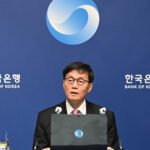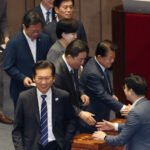Park Il Young, chief executive of KIC, speaks at the ASK 2024 conference on Oct. 16, 2024
Sovereign wealth fund Korea Investment Corporation (KIC) will aggressively explore early private debt investments in sectors undergoing AI-driven innovation, which is expected to unlock their valuations, said its new chief executive on Wednesday.
“AI Technology will rapidly innovate and increase valuations for not only sicence and medical industries but also almost all industries, which have big implications for alternative investments,” said Patk Il Young in a keynote speech for the global investment conference ASK 2024.
“We will look for [investment] opportunities created by technology innovation,” added the former World Bank Group executive director, who took over as KIC’s chief executive late last month.
He cited data storage and management, cyber security and education and healthcare as beneficiaries of the AI boom.
In the infrastructure sector, it will boost exposure to North America and emerging markets in pursuit of stable cash flows, while seeking to imit their downside risk.
Park Il Young gives a keynote speech at the first day of the Oct. 16-17 global investment forum ASK 2024
Overall, the sovereign wealth fund will take a more selective approach to alternative assets and reinforce risk management as escalating tensions in the Middle East, the prolonged Ukraine-Russia war and political uncertainties pose risks to consumer prices and global supply chains.
Park pointed out the surge in VIX, a volatility index, in August, underscored investors jitters about market risks, despite the US stock market’s bull run amid moderating inflation and growing hopes for economic recovery.
“We will take a more selective approach to alternative investments, which require risk management and sharp insight more than before,” he said
It was Park’s first public speech at an international investment conference as KIC’s chief since appointed to the post late last month.
For the real estate portfolio, the KIC will target data and logistics centers, as well as residential buildings, for private debt as the sectors still find it difficult to borrow money, despite falling interest rates.
As of the end of 2023, some 22% of its $189.4 billion in assets under management is allocated to alternative investments.
By Yeonhee Kim
yhkim@hankyung.com
Jennifer Nicholson-Breen edited this article















